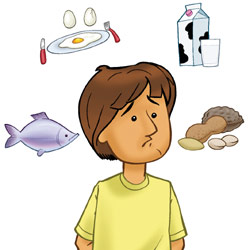Health Canada Reminds Canadians of the Importance of Food Allergy Awareness

Friday, May 13, 2011 - 09:40
May 12, 2011
For immediate release
For immediate release
OTTAWA - Health Canada is reminding Canadians of the importance of allergy awareness. For those with food allergies, severe allergic reactions can occur quickly and without warning, and some foods can be life-threatening to people of all ages, particularly children.
It's estimated that as many as 1.2 million Canadians may be affected by allergies and some studies indicate that these numbers are increasing, especially among children. Foods account for most people's allergies, with peanuts, tree nuts, sesame, soy, seafood, wheat, eggs, milk, mustard and sulphites being the food allergens most commonly associated with severe allergic reactions in Canada.
When someone ingests even a tiny amount of an allergen, the symptoms of a reaction may develop quickly and can become very serious. The most dangerous symptoms include breathing difficulties, a drop in blood pressure with shock, which may result in loss of consciousness and even death.
There is no cure for food allergies. Avoiding the consumption of an allergen is the only effective way to prevent allergic reactions. There are many important steps that you can take to help protect yourself. Some general tips include:
- Read product labels very carefully as manufacturers sometimes change the ingredients used in familiar products.
- Avoid food products that contain the specific allergens and/or derivatives of the specific allergens that you are allergic to.
- Avoid food products that bear a precautionary statement naming an allergen that you are allergic to; for example, precautionary statements like "may contain X" (where "X" is the name by which the allergen is commonly known).
- Avoid food products that don't list their ingredients or food products that contain an ingredient that you don't recognize.
- When eating at a friends' or in a restaurant, tell your host/server about your food allergy, and ask specific questions about the food to be served.
- If an allergist prescribes an epinephrine/adrenaline auto-injector, learn how to use it properly and carry it with you at all times.
- Always wear a MedicAlert identifier so that, in case of an accident, others know about your allergies and reactions.
- Look out for allergens listed by other names - food allergens and their derivatives are sometimes found in food under different names.
For more information on allergy awareness, please visit:
Government of Canada's Tip Sheet on Avoiding Common Allergens in Food


